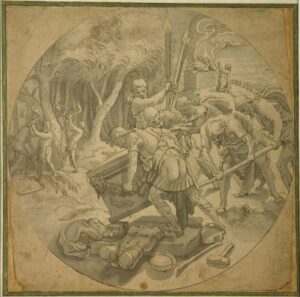
But Joash said to all who stood against him, “Will you contend for Baal, or will you save him? Whoever will contend for him shall be put to death by morning. If he is a god, let him contend for himself, since someone has torn down his altar!” Therefore on that day he named Gideon Jerubbaal, that is to say, “Let Baal contend against him,” because he had torn down his altar.
Gideon went on to lead a small army of untrained men against the Midianites, saving the children of Israel from them. The Gideons International, an organization of which I am a member, takes their name from this inspiring Biblical account.
Recently, archaeologists have uncovered evidence that supports one detail of this account. While digging in a small site 3 km west of the large archaeological site/Israeli National Park called Tel Lachish, they uncovered pottery fragments that are thought to have been made in the late twelfth or early eleventh century BC, which is the same time period in which Gideon’s story happened.
While the pottery is far from complete, the recovered pieces contain a painted inscription that reads, “Yrb‘l,” which means Jerubba‘al, the name Joash gave his son. In discussing their find in the context of other relevant finds, the archaeologists say:
The chronological correlation between the biblical tradition and ancient Judean inscriptions indicates that the biblical text preserves authentic Judean onomastic traditions.
In other words, this find and others indicate that the names mentioned in the Bible are not fictional. They are real names that were used in the relevant geographic and historical settings.

My family once held a hatred for Christianity because of the past. Yet, when I was young, lo these unnamed decades ago, psychologists in the family said the only way to stop the drug abuse, alcoholism, and fights in the family was to find a religion. Some tried the old religions but they were no good. Other tried the new religion, but they didn’t help much. I was one of the earliest to leave atheism to come to Christ, and received a lot of mocking because of it. Then Dad died, but came back. That shocked a great many in the family and they began to attend church, then went to Bible churches. Today, most of us are believers, and the family prospers. We still believe in good education and science, but not as the way to freedom, but because God commanded us to be educated. Dad died again and again was brought back. This time, he stopped smoking and drinking, and would call his siblings and tell them they have to born again and Spirit filled. Leave the apostate churches where the ancestors hid to pretend we believed (that was the law, American Indians were not allowed to practice any old religions). As he was bloka (head man) for a lot of families, his ‘witness’ was valued. God’s peace be on you always.